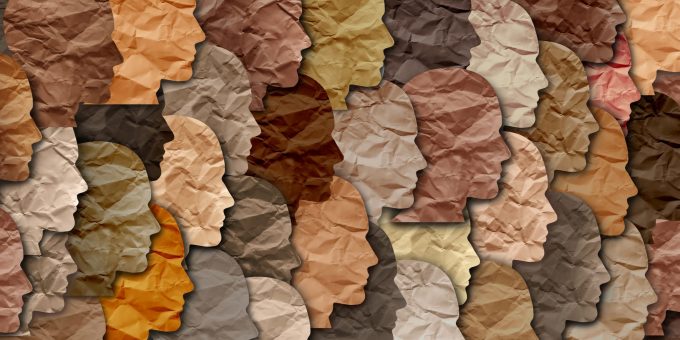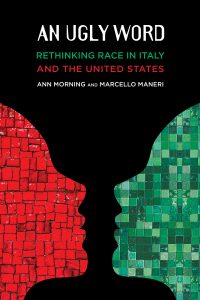
iStockPhoto.com // wildpixel
Race, “That Ugly Word”
Recently, a Swedish friend asked what my latest book was about. Upon learning that it was a comparison of racial thinking in the United States and Italy, she responded, “Of course; race is such a problem in the United States!”
The idea that race is an issue in places like the United States or South Africa, but not in Europe, is fairly widespread on the other side of the Atlantic, and frequently articulated by European scholars and politicians. When French education officials threatened in 2021 to launch an investigation into university research on race, gender, and post-colonial studies, President Emmanuel Macron jumped into the fray to denounce “social science theories entirely imported from the United States.’’
 In An Ugly Word: Rethinking Race in Italy and the United States, I teamed up with Italian sociologist Marcello Maneri at the University of Milan-Bicocca to test the widespread assumption that Americans and Western Europeans have fundamentally different ways of understanding race—namely, that a biological model persists in the United States whereas race is understood in cultural terms (if acknowledged at all) in Europe. Through more than 150 interviews with college-age students in the two countries, we found that while young people on each side of the Atlantic had very different ways of talking about race, the underlying beliefs they expressed had a great deal in common.
In An Ugly Word: Rethinking Race in Italy and the United States, I teamed up with Italian sociologist Marcello Maneri at the University of Milan-Bicocca to test the widespread assumption that Americans and Western Europeans have fundamentally different ways of understanding race—namely, that a biological model persists in the United States whereas race is understood in cultural terms (if acknowledged at all) in Europe. Through more than 150 interviews with college-age students in the two countries, we found that while young people on each side of the Atlantic had very different ways of talking about race, the underlying beliefs they expressed had a great deal in common.
The national divergence in speech norms is captured in the refrain we heard time and again when we asked young Italians how they defined the term “race” (razza In Italian): “Che brutta parola!” they would exclaim, “What an ugly word!” Our interviewees in Italy repeatedly told us that they had been taught never to say that word, that they avoided using it, and that it represented a dangerous ideology that Adolf Hitler had concocted (but which, they insisted, had been laid to rest with the Führer).
In contrast, American students often described race as a sensitive topic, but they did not blanch at mention of the word.
Surprisingly, however, young Italians’ visceral rejection of the word “race” did not lead them to eschew racial labels like “White” or especially “Black,” or to refute longstanding folk theories about physical differences between racialized groups. About half of both the Americans and Italians we spoke to defined race as a matter of biological traits, and roughly a third of each group maintained that our species is subdivided into “biological races.”
Strikingly, Italian students were even more likely than American ones to attribute the over-representation of African-descent people in certain sports (like track and field) to physical characteristics they believed were unique to Black people. Just as tellingly, neither Italians nor Americans applied the same logic to sports (like swimming) in which European-descent athletes were overrepresented. When Whites dominate a sport, like ice hockey, the thinking went, it’s not because of their body types but due to their cultural preferences, structural advantages, and/or dedication.
Contrary to popular perceptions, our findings make clear that there is no unique or consistent cultural understanding of race in Western Europe. The Italian respondents often invoked the kinds of biological explanations for racial differences one might expect to find in the United States. On the American side, many students I interviewed described race as a matter of cultural differences (“like how you eat, what you eat, to what you wear to like, I mean, the language, everything,” said one). Clearly, a culture-versus-biology dichotomy is not a useful way to distinguish how beliefs about race differ across the Atlantic.
So, what would be a better approach? In An Ugly Word, we encourage researchers to pay attention to multiple dimensions of a broader set of ideas we call “concepts of descent-based difference” (borrowing from historian David Hollinger’s notion of “communities of descent”). This approach includes considering kindred classification systems (e.g., ethnicity, caste, tribe) and investigating the beliefs they contain about the nature and origins of groups’ supposed signature traits (we expand on this idea in a recent Ethnic and Racial Studies symposium).With this perspective, we encourage researchers to cast a wide net when exploring concepts of difference in order to capture important group boundaries that respondents may not describe explicitly as “race.” In the Italian case, for example, our respondents articulated distinct and salient categories for the Roma, Chinese, Moroccans, Muslims, and meridionali (Southern Italians), amongst others. If we had focused narrowly on respondents’ beliefs about “le razze”—which at least historically would connote Jews and Blacks—we would have missed a major part of their imagined landscape of descent-based difference. What a term like “race” or “ethnicity” means cannot be assumed at the outset, particularly when conducting global comparative research, and it may not encompass all the communities of descent that are meaningful to people in a given time and place.
Ann Morning is in the Department of Sociology at New York University. She is the author of The Nature of Race: How Scientists Think and Teach About Human Difference

Comments